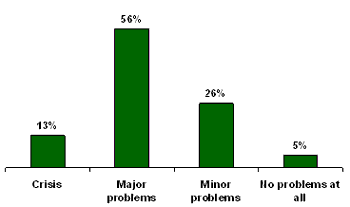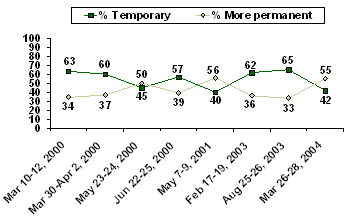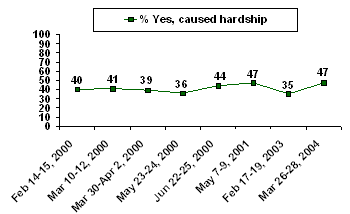GALLUP NEWS SERVICE
PRINCETON, NJ -- According to AAA, nationwide gas prices are now at record highs, averaging $1.77 per gallon. A recent CNN/USA Today/Gallup poll finds nearly 7 in 10 Americans saying the cost of gasoline represents a crisis or major problem for the United States. In recent years, the public has tended to see rising gas prices as only a short-term phenomenon, but now Americans expect the recent increases will be a more permanent change in the cost of gasoline. Slightly less than half of Americans say that the higher gas prices have caused financial hardship for their households, but a majority believes higher gas prices this summer will lead to hardship.
The poll, conducted March 26-28, finds 13% of Americans describing the cost of gasoline as a crisis for the United States, with an additional 56% calling it a major problem. Twenty-six percent say it is a minor problem and 5% say it is not a problem at all.| Now, thinking about the cost of
gasoline, would you say the country – is in a state of crisis, has major problems, has minor problems, or has no problems at all? |
 |
| March 26-28, 2004 |
While the level of concern about gas prices is high, it only ranks in the middle of a list of recent events for which Gallup has measured public concern. For example, 81% of Americans said Iraq's military and weapons capabilities were a crisis or major problem in early 2003. Seventy-seven percent said the same about the wave of business scandals in 2001-2002.
Selected Events Rated as Crisis or Major Problems, Gallup Polls, 1994-2004
|
Event |
Date |
Crisis |
Major |
Crisis/Major |
|
% |
% |
% |
||
|
Iraq's military and weapons capabilities |
2003 Jan 3-5 |
25 |
56 |
81 |
|
Medicare system |
1995 Sep 22-24 |
23 |
58 |
81 |
|
North Korea's military and weapons capabilities |
2003 Sep 19-21 |
22 |
59 |
81 |
|
Need for food, water, medicine for Iraqi civilians |
2003 Mar 29-30 |
30 |
49 |
79 |
|
Business scandals |
2002 Jun 28-30 |
20 |
57 |
77 |
|
Federal budget deficit |
2003 Jul 18-20 |
20 |
57 |
77 |
|
U.S. healthcare system |
1994 Sep 6-7 |
17 |
52 |
69 |
|
Cost of gasoline |
2004 Mar 26-28 |
13 |
56 |
69 |
|
Stock market declines |
2002 Jul 22-24 |
18 |
50 |
68 |
|
Social Security system |
2002 Sep 20-22 |
13 |
54 |
67 |
|
2000 presidential election situation |
2000 Nov 26-27 |
10 |
50 |
60 |
|
House of Representatives' vote to impeach Bill Clinton |
1998 Dec 15-16 |
20 |
35 |
55 |
|
Federal government shutdown |
1995 Nov 17-18 |
12 |
40 |
52 |
|
Mad cow disease in U.S. |
2004 Jan 2-5 |
6 |
28 |
34 |
At points in the past four years when gas prices have increased sharply, Gallup has asked Americans whether they expect the change in prices to be permanent or only temporary. Typically, Americans have tended to see gas price increases as only temporary. However, the latest survey finds that 55% of Americans believe the recent price increases represent a "more permanent change in prices," while 42% say they are only "a temporary fluctuation in prices." In only one other survey, conducted in May 2001 during the energy crisis epitomized by the rolling blackouts in California, did a majority of Americans expect that gas price increases would persist.
| Do you think the current rise in gas prices represents – a temporary fluctuation in prices, or a more permanent change in prices? |
 |
Republicans are more optimistic that the recent changes are only temporary, by a 55% to 44% margin. On the other hand, both independents and Democrats are much more likely to believe the changes are more permanent -- independents by a 68% to 31% margin and Democrats by a 56% to 38% margin.
Financial Hardship
The major concern with increasing gas prices is that they will become a financial burden for many consumers, affecting travel plans and increasing pressure on monthly budgets. Currently, slightly less than half of Americans, 47%, say the recent gas price increases have caused personal financial hardship for their households, while 53% say they have not.
The current data show the highest percentage of Americans adversely affected by rising gas prices (dating back to 2000), tied with a 47% reading in May 2001.
| Have recent price increases in gasoline caused any financial hardship for you or your household? |
 |
Looking ahead, 58% of Americans expect that gas price increases will cause financial hardship for their families this summer, when prices are expected to rise even higher. Forty-two percent do not expect to experience financial hardship.
On both measures of financial hardship -- present and future -- Americans living in lower-income households are much more likely to have suffered (or expect to suffer) from higher gas prices. The poll finds 58% of those with household incomes of less than $50,000 saying they have experienced financial hardship because of the increased gas prices, compared with 31% of those with incomes of $50,000 and above. Additionally, 70% of those with household incomes of less than $50,000 say they expect to experience financial hardship this summer because of higher gas prices, an expectation shared by only 43% of those living in households with incomes of $50,000 or greater.
Survey Methods
These results are based on telephone interviews with a randomly selected national sample of 1,001 adults, aged 18 and older, conducted March 26-28, 2004. For results based on this sample, one can say with 95% confidence that the maximum error attributable to sampling and other random effects is ±3 percentage points. In addition to sampling error, question wording and practical difficulties in conducting surveys can introduce error or bias into the findings of public opinion polls.
Q.34-35 SPLIT SAMPLED
34. Now, thinking about the cost of gasoline, would you say the country – [ROTATED: is in a state of crisis, has major problems, has minor problems, (or) has no problems at all]?
BASED ON –510—NATIONAL ADULTS IN FORM A
|
|
|
|
No problems |
|
|
|
2004 Mar 26-28 |
13% |
56 |
26 |
5 |
* |
35. Do you think the current rise in gas prices represents – [ROTATED: a temporary fluctuation in prices, or a more permanent change in prices]?
BASED ON –491—NATIONAL ADULTS IN FORM B
|
Temporary |
More permanent |
No opinion |
||
|
% |
% |
% |
||
|
2004 Mar 26-28 ^ |
42 |
55 |
3 |
|
|
2003 Aug 25-26 |
65 |
33 |
2 |
|
|
2003 Feb 17-19 ^ |
62 |
36 |
2 |
|
|
2001 May 7-9 ^ |
40 |
56 |
4 |
|
|
2000 Jun 22-25 ^ |
57 |
39 |
4 |
|
|
2000 May 23-24 ^ |
45 |
50 |
5 |
|
|
2000 Mar 30-Apr 2 ^ |
60 |
37 |
3 |
|
|
2000 Mar 10-12 ^ |
63 |
34 |
3 |
|
|
^ |
Asked of a half sample. |
|||
Q.36-37 SPLIT SAMPLED
36. Have recent price increases in gasoline caused any financial hardship for you or your household?
BASED ON –510—NATIONAL ADULTS IN FORM A
|
Yes, |
No, has not |
No |
||
|
% |
% |
% |
||
|
2004 Mar 26-28 |
47 |
53 |
* |
|
|
2003 Feb 17-19 |
35 |
65 |
* |
|
|
2001 May 7-9 |
47 |
53 |
* |
|
|
2000 Jun 22-25 |
44 |
56 |
* |
|
|
2000 May 23-24 |
36 |
64 |
* |
|
|
2000 Mar 30-Apr 2 |
39 |
61 |
* |
|
|
2000 Mar 10-12 |
41 |
59 |
* |
|
|
2000 Feb 14-15 ^ |
40 |
60 |
* |
|
|
^ |
WORDING: Have recent price increases in gasoline, diesel fuel, and home fuel oil caused any financial hardship for you or your household? |
|||
37. Do you expect that price increases in gasoline will -- or will not -- cause any financial hardship for you and your household this summer?
BASED ON –491—NATIONAL ADULTS IN FORM B
|
Yes, will |
No, will not |
No opinion |
|
|
2004 Mar 26-28 |
58% |
42 |
* |

